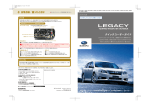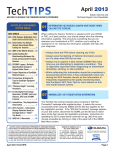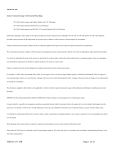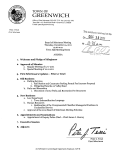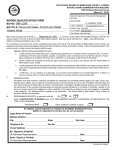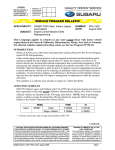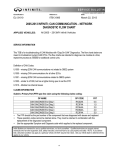Download 11-130-13 - FT86club.com
Transcript
ATTENTION: GENERAL MANAGER PARTS MANAGER CLAIMS PERSONNEL SERVICE MANAGER q q q q IMPORTANT - All Service Personnel Should Read and Initial in the boxes provided, right. SERVICE BULLETIN APPLICABILITY: SUBJECT: 2013MY Legacy and Outback 2.5L Models NUMBER: 11-130-13 2012-13MY Impreza 2.0L Models DATE: 04/05/13 2013MY XV Crosstrek 2011-2014MY Forester NA Models Only 2013MY BRZ Difficulty Starting, Rough Idle, Cam Position or Misfire DTCs P0340, P0341, P0345, P0346, P0365, P0366, P0390, P0391, P0301, P0302, P0303 or P0304 INTRODUCTION This Bulletin provides inspection and repair procedures for intake and exhaust camshaft position-related and/or engine misfire DTCs for the FA and FB engine-equipped models listed above. The camshaft position sensor (CPS) clearance may be out of specification causing these condition(s) and one or more of the DTCs listed above to set. In addition to a Check Engine light coming on, there may or may not be customer concerns of rough idle, extended cranking or no start. NOTES: • ThisServiceBulletinwillreplaceBulletinnumbers11-100-11R,11-122-12, 11-124-12Rand11-125-12. • ReadthisBulletincompletelybeforestartinganyrepairs as service procedures have changed. • An exhaust cam position sensor clearance out of specification will NOT cause a startability issue. COUNTERMEASUREINPRODUCTION MODEL STARTING VIN Legacy D*038918 Outback D*295279 Impreza 4-Door D*020700 Impreza 5-Door XV Crosstrek D*835681 Forester E*410570 BRZ D*607924 NOTE: These VINs are for reference only. There may be a small number of vehicles after the starting VINs listed above which do not have the countermeasure due to production sequence changes. continued... CAUTION: VEHICLE SERVICING PERFORMED BY UNTRAINED PERSONS COULD RESULT IN SERIOUS INJURY TO THOSE PERSONS OR TO OTHERS. Subaru Service Bulletins are intended for use by professional technicians ONLY. They are written to inform those technicians of conditions that may occur in some vehicles, or to provide information that could assist in the proper servicing of the vehicle. Properly trained technicians have the equipment, tools, safety instructions, and know-how to do the job correctly and safely. If a condition is described, DO NOT assume that this Service Bulletin applies to your vehicle, or that your vehicle will have that condition. Bulletin Number: 11-130-13; Date: 04/05/13 SUBARU OF AMERICA, INC. IS “ISO 14001 COMPLIANT” The international standard for excellence in Environmental Management Systems. Please recycle or dispose of automotive products in a manner that is friendly to our environment and in accordance with all local, state and federal laws and regulations. Page 1 PARTINFORMATION • Shim Kit, p.n. 10130AA060, contains 8 cam position sensor shims, 0.1 to 0.8mm in thickness. • Shim Kit, p.n. 10130AA160, contains 8 cam position sensor shims (same thicknesses) to adjust the gap of the right-hand (Bank 1) exhaust camshaft position sensor on BRZ ONLY. • Camshaft position sensor o-ring, p.n. 13099AA050 (one-time use item). NOTE: The part numbers shown below are for reference only and cannot be ordered individually. If a shim is required, the corresponding shim kit must be ordered. R/H (B1) EXHAUST ONLY INTAKE AND L/H (B2) EXHAUST ONLY PART NUMBER- CLEARANCE (MM) SHIM THICKNESS (MM) TARGET GAP (MM) 10130AA170 10130AA070 0.45 - 0.55 0.8 1.25 - 1.35 10130AA180 10130AA080 0.56 - 0.65 0.7 1.26 - 1.35 10130AA190 10130AA090 0.66 - 0.75 0.6 1.26 - 1.35 10130AA200 10130AA100 0.76 - 0.85 0.5 1.26 - 1.35 10130AA210 10130AA110 0.86 - 0.95 0.4 1.26 - 1.35 10130AA220 10130AA120 0.96 - 1.05 0.3 1.26 - 1.35 10130AA230 10130AA130 1.06 - 1.15 0.2 1.26 - 1.35 10130AA240 10130AA140 1.16 - 1.25 0.1 1.26 - 1.35 PART NUMBER- SPECIALTOOLS • Pulse/Analog Box, SDI Box and SSMIII • Digital Caliper with depth attachment or 1” Depth Micrometer • If you do not have a depth attachment or a 1” Depth Micrometer, use a flat washer, (outside diameter 25.5mm, inside diameter 11.1mm, 7.72mm thick) or equivalent. The purpose of the flat washer is to provide a surface for the caliper to rest on while making the sensor clearance measurements. Digital Caliper with Depth Attachment continued... Bulletin Number: 11-130-13; Date: 04/05/13 Page 2 SERVICEPROCEDURE/INFORMATION The Service Procedure of this Bulletin will have 2 sections, one for the intake cam position sensors and a second for the exhaust. Check the waveforms of the applicable sensor (intake and / or exhaust) using the Pulse/ Analog Box, SDI Box and the oscilloscope function of the SSMIII. For detailed information and operating instructions, refer to the applicable Service Manual or the Subaru Diagnostic System (SDS) SSMIII User Guide. Click on “Help” at the top of the SSMIII Main Menu screen for the User Guide and additional helpful information. IMPORTANT: When back-probing the ECM connectors to attach oscilloscope leads, refer to the wiring schematic for the specific DTC being diagnosed in the applicable Service Manual for proper connector and pin terminal locations. UnderstandingtheRelationshipsbetweentheCrankandCamshaftPositionSensors When setting up your oscilloscope to check Camshaft Position Sensor data, also select the Crankshaft Position Sensor data to help your understanding. It is important to arrange your selections in the order shown in the following screen shot examples. The Crank sensor data will make it easier to establish the firing order and identify cam sensor waveform inconsistencies. Example1 on the next page is a perfectly normal pattern for all 3 sensors. Let’s look at some specifics of the data which will help you determine a “good” pattern versus a “bad” one. Looking at the crank signal on page 4, you will see the difference between what we will call “1’s” (a single spike) and “2’s” (a double spike). This helps establish the engine’s firing order and what the corresponding cam sensor data should look like. The ECM looks for the “Edges” of the cam position sensor voltage drops to be within specified time “Window” parameters. The chart below Example 1 on the next page will help bring this all together. (Range was set to 250 msec / div. so the crank signal would be easier to understand here.) continued... Bulletin Number: 11-130-13; Date: 04/05/13 Page 3 2 1 2 1 Time “Window” “Edges” (drops) “EXAMPLE 1” Engine Firing Order #1 #3 #2 #4 Crank Signal (“1” or “2”?) “1” “2” “1” “2” Is Cam Signal Edge Within Window RH? Yes No Yes Yes Is Cam Signal Edge Within Window LH? Yes Yes No Yes NOTE: A LH cam position sensor signal does not always indicate a corresponding #2 or #4 cylinder firing. (The same applies to the RH side.) Using the chart above and comparing it to Example1, it can be determined the first cylinder shown in the screen shot is #3 because the crank signal is a “2” and there is an edge signal within the window on the LH but not the RH cam sensor. Next cylinder in the firing order would be #2 as the crank position signal is a “1” and there is an edge signal in the window for the RH but not for the LH, and so on… continued... Bulletin Number: 11-130-13; Date: 04/05/13 Page 4 Example2 below shows a “Bad” pattern for the RH cam sensor. Marks #1 and #2 show what appears to be #4 cylinder firing but, the next cylinder to fire according to the screen shot is #2 followed by #4 then #1. The pattern for the RH sensor never shows the proper sequence to fire #3 cylinder. In this case, recheck the data again after installing a .2mm shim under the RH cam sensor. ProperFiringOrderis: #3 #2 #4 #1 #3 #2 FiringOrdershowninscreenshot: #4 #2 #4 #1 #4 #2 Erratic Cam Sensor Signals “EXAMPLE 2” continued... Bulletin Number: 11-130-13; Date: 04/05/13 Page 5 Example3 shows what appears to be an erratic signal from the RH cam sensor but, you can see all the cam sensor data signal edges (drops) follow the chart and firing order as they are supposed to. Other signal edges (rises or drops) outside the “window” or a longer time line as shown here prior to the #4 signal edges seen on the RH cam sensor pattern are examples of signals which will be “ignored” by the ECM and are not a cause for concern. #4 #1 #3 Normal Cam Sensor Signals #2 #4 Rise outside of “Window” “EXAMPLE 3” continued... Bulletin Number: 11-130-13; Date: 04/05/13 Page 6 IMPORTANT: If you confirm an irregular wave form pattern, BEFORE performing the measurement and shim selection procedures, install a .2mm shim under the suspect intake or exhaust camshaft position sensor. If there is no change, remove the .2mm shim and install a .4mm shim. USEONLYONESHIMPERSENSOR,NOSTACKING. If the wave pattern is lost, remove the .4mm shim and replace with a .3mm shim. Recheck the pattern and if it appears normal, complete the repair as shown below. If an abnormal pattern persists, proceed with the rest of the clearance measurement and shim selection procedures. a. b. c. d. e. Install a NEW camshaft position sensor o-ring (one-time use item). Reinstall the camshaft position sensor and shim. Torque the sensor retaining bolt to 6.4 Nm (4.7 ft. lbs. or 56.4 inch-pounds). Reconnect the sensor engine wiring harness connector. Reconnect the negative battery cable then reset the radio station presets (and navigation system favorites if applicable) to complete the repair. If an abnormal oscilloscope pattern persists for an intake sensor, measure the clearance between the end of the camshaft position sensor and the sensor plate using the following procedure. If a suspect pattern is verified for an exhaust sensor, a revised procedure will be outlined later in this Bulletin. If the pattern is normal, refer to the applicable Service Manual for additional troubleshooting and diagnostic procedures for the stored DTCs. MEASUREMENTANDSHIMSELECTIONPROCEDURES Thespecifiedclearanceis1.3+/-.05mm(1.25to1.35mmor.049”to.053”). 1. Record the customer’s radio station presets (and navigation system favorites if applicable). 2. Disconnect the negative battery cable. 3. Remove the camshaft position sensor from the timing chain cover using the procedure in the applicable Service Manual. T = 6.4 N•m (0.7 kgf-m, 4.7 ft-lb) Camshaft Sensor Timing Chain Cover Shim (to be added) continued... Bulletin Number: 11-130-13; Date: 04/05/13 Page 7 A = Top of timing chain cover to camshaft position sensor plate B = Camshaft position sensor mating surface to the bottom of the sensor B A Camshaft position sensor plate. NOTE: When measuring “A”, make sure you are measuring to the outside diameter or “top” of the sensor plate and not to the bottom of a notch as shown below. Be sure to record all measurements. Top of Plate Notch continued... Bulletin Number: 11-130-13; Date: 04/05/13 Page 8 Measurement taken using digital caliper with depth attachment. Measurement taken using digital caliper with washer. IMPORTANT: When using the flat washer, make sure the washer is fully seated on the machined surfaces of the timing cover or your measurements will not be accurate. 1. Take a measurement and record the reading. 2. Using a breaker bar and 22mm socket, place the socket on the crankshaft pulley bolt and rotate the engine clockwise approximately 70°. CAUTION: Do not rotate the engine counter-clockwise, doing so will loosen the crankshaft pulley bolt. If the engine is accidently turned counter-clockwise make sure the bolt is re-torqued following the proper procedure in the applicable Service Manual. 3. Take a measurement and record the reading. 4. Rotate the engine clockwise approximately 70°. 5. Take a measurement and record the reading. 6. Use the smallest of the three measurements and record the result. continued... Bulletin Number: 11-130-13; Date: 04/05/13 Page 9 When taking measurement “B”, use a flat steel ruler or equivalent along with the digital caliper. 7. Measure the distance between the camshaft position sensor mounting surface and the bottom of the sensor as shown above. IMPORTANT: Be sure to account for the thickness of the flat washer (if you are using one) when performing your calculations to determine the required shim thickness. Thespecifiedclearanceis1.3+/-.05mm(1.25to1.35mmor.049”to.053”). Examplecalculation (the 1.72mm thickness of the flat washer is subtracted from “A” dimension) A = Top of timing chain cover to camshaft position sensor plate B = Camshaft position sensor mating surface to the bottom of the sensor A) 25.42 – 1.72 = 23.70 A = 23.70 B = 22.58 A – B = 1.12 (clearance) In this example a 0.2 shim is required. Clearance (mm) 1.06 – 1.15 Shim Thickness (mm) 0.2 Target Gap (mm) 1.26 – 1.35 continued... Bulletin Number: 11-130-13; Date: 04/05/13 Page 10 8. After the correct shim is selected and a normal oscilloscope pattern has been verified: a. Install a NEW camshaft position sensor o-ring (one-time use item). b. Reinstall the camshaft position sensor and shim. c. Torque the sensor retaining bolt to 6.4 Nm (4.7 ft. lbs. or 56.4 inch-pounds). d. Reconnect the sensor engine wiring harness connector. e. Reconnect the negative battery cable then reset the radio station presets (and navigation system favorites if applicable) to complete the repair. BRZEXHAUSTCAMSHAFTPOSITIONSENSORPROCEDURE In the event you have a DTC stored for an exhaust camshaft position sensor, the repair procedure has been revised. Due to the position of the right-hand (Bank 1) sensor, measurement of the gap without removing the front catalyst is extremely difficult as shown in the photo below. Cam Position Sensor Harness Connector In addition, the engine under-guards must be removed along with the plastic splash shield to access the left-hand (Bank 2) sensor. As a solution, the following procedure has been developed: 1. Confirm the irregular oscilloscope pattern for the corresponding DTC stored. 2. Remove the sensor from the timing cover and install a .2mm thick shim from the applicable kit. 3. Reinstall the sensor, torque the sensor retaining bolt to 6.4 Nm (4.7 ft. lbs. or 56.4 inch-pounds) then recheck the oscilloscope pattern. continued... Bulletin Number: 11-130-13; Date: 04/05/13 Page 11 If the pattern is normal, the repair is complete. If the irregular pattern persists, repeat Steps 2 and 3 after removing the .2mm shim and installing a .3 mm thick shim. ONESHIMONLY, NOSTACKING. Repeat as necessary increasing the shim thickness .1 mm at a time until a normal scope pattern can be verified. 4. After the correct shim is selected: a. b. c. d. e. Install a new camshaft position sensor o-ring (one-time use item). Reinstall the camshaft position sensor and shim. Torque the sensor retaining bolt to 6.4 Nm (4.7 ft. lbs. or 56.4 inch-pounds). Reconnect the sensor engine wiring harness connector. Reconnect the negative battery cable and reset the radio station presets (and navigation system favorites if applicable) to complete the repair. 5. Be sure to clear the ECM memory before returning the vehicle to the customer. WARRANTY/CLAIMINFORMATION For vehicles within the Basic New Car Limited Warranty period, this repair may be claimed using the following information: Labor Description Intake Cam Sensor Measurement and Shim Installation Exhaust Cam Sensor Measurement and Shim Installation Bulletin Number: 11-130-13; Date: 04/05/13 Labor Operation# Fail Code A817-211 Labor Time 0.5 UKM-20 A817-213 0.6 Page 12












